
-
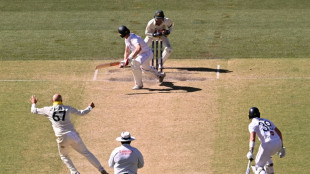 England 'flat' as Crawley admits Australia a better side
England 'flat' as Crawley admits Australia a better side
-
Australia four wickets from Ashes glory as England cling on

-
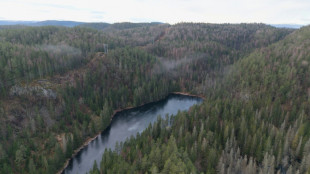 Beetles block mining of Europe's biggest rare earths deposit
Beetles block mining of Europe's biggest rare earths deposit
-
French culture boss accused of mass drinks spiking to humiliate women

-
 NBA champions Thunder suffer rare loss to Timberwolves
NBA champions Thunder suffer rare loss to Timberwolves
-
Burning effigy, bamboo crafts at once-a-decade Hong Kong festival
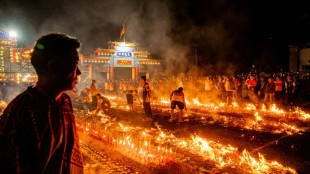
-
 Joshua knocks out Paul to win Netflix boxing bout
Joshua knocks out Paul to win Netflix boxing bout
-
Dogged Hodge ton sees West Indies save follow-on against New Zealand

-
 England dig in as they chase a record 435 to keep Ashes alive
England dig in as they chase a record 435 to keep Ashes alive
-
Wembanyama 26-point bench cameo takes Spurs to Hawks win

-
 Hodge edges towards century as West Indies 310-4, trail by 265
Hodge edges towards century as West Indies 310-4, trail by 265
-
US Afghans in limbo after Washington soldier attack

-
 England lose Duckett in chase of record 435 to keep Ashes alive
England lose Duckett in chase of record 435 to keep Ashes alive
-
Australia all out for 349, set England 435 to win 3rd Ashes Test

-
 US strikes over 70 IS targets in Syria after attack on troops
US strikes over 70 IS targets in Syria after attack on troops
-
Australian lifeguards fall silent for Bondi Beach victims

-
 Trump's name added to Kennedy Center facade, a day after change
Trump's name added to Kennedy Center facade, a day after change
-
West Indies 206-2, trail by 369, after Duffy's double strike

-
 US strikes Islamic State group in Syria after deadly attack on troops
US strikes Islamic State group in Syria after deadly attack on troops
-
Epstein files opened: famous faces, many blacked-out pages
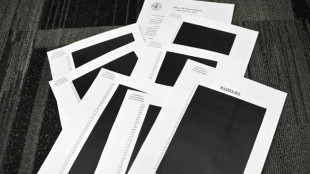
-
 Ravens face 'special' Patriots clash as playoffs come into focus
Ravens face 'special' Patriots clash as playoffs come into focus
-
Newly released Epstein files: what we know

-
 Musk wins US court appeal of $56 bn Tesla pay package
Musk wins US court appeal of $56 bn Tesla pay package
-
US judge voids murder conviction in Jam Master Jay killing

-
 Trump doesn't rule out war with Venezuela
Trump doesn't rule out war with Venezuela
-
Haller, Aouar out of AFCON, Zambia coach drama

-
 Nasdaq rallies again while yen falls despite BOJ rate hike
Nasdaq rallies again while yen falls despite BOJ rate hike
-
Bologna win shoot-out with Inter to reach Italian Super Cup final

-
 Brandt and Beier send Dortmund second in Bundesliga
Brandt and Beier send Dortmund second in Bundesliga
-
Trump administration begins release of Epstein files

-
 UN Security Council votes to extend DR Congo mission by one year
UN Security Council votes to extend DR Congo mission by one year
-
Family of Angels pitcher, club settle case over 2019 death

-
 US university killer's mystery motive sought after suicide
US university killer's mystery motive sought after suicide
-
Rubio says won't force deal on Ukraine as Europeans join Miami talks

-
 Burkinabe teen behind viral French 'coup' video has no regrets
Burkinabe teen behind viral French 'coup' video has no regrets
-
Brazil court rejects new Bolsonaro appeal against coup conviction

-
 Three-time Grand Slam winner Wawrinka to retire in 2026
Three-time Grand Slam winner Wawrinka to retire in 2026
-
Man Utd can fight for Premier League title in next few years: Amorim

-
 Pandya blitz powers India to T20 series win over South Africa
Pandya blitz powers India to T20 series win over South Africa
-
Misinformation complicated Brown University shooting probe: police

-
 IMF approves $206 mn aid to Sri Lanka after Cyclone Ditwah
IMF approves $206 mn aid to Sri Lanka after Cyclone Ditwah
-
US halts green card lottery after MIT professor, Brown University killings
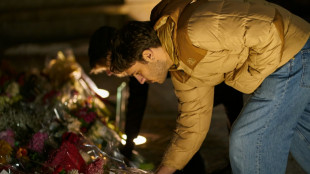
-
 Stocks advance as markets cheer weak inflation
Stocks advance as markets cheer weak inflation
-
Emery says rising expectations driving red-hot Villa

-
 Three killed in Taipei metro attacks, suspect dead
Three killed in Taipei metro attacks, suspect dead
-
Seven Colombian soldiers killed in guerrilla attack: army

-
 Amorim takes aim at Man Utd youth stars over 'entitlement'
Amorim takes aim at Man Utd youth stars over 'entitlement'
-
Mercosur meets in Brazil, EU eyes January 12 trade deal

-
 US Fed official says no urgency to cut rates, flags distorted data
US Fed official says no urgency to cut rates, flags distorted data
-
Rome to charge visitors for access to Trevi Fountain


Preparing for the worst near Ukraine's precarious nuclear plant
In the southern city of Zaporizhzhia, which lies close to Europe's largest nuclear plant, which has been targeted by shelling, Ukrainians are picking up iodine pills and preparing for the worst.
The city lies some 50 kilometres (30 miles) as the crow flies from the Zaporizhzhia nuclear plant which has been occupied by Russian troops since early March in an area hit by ongoing fighting.
Moscow and Kyiv have traded blame over the shelling around the complex and the nearby town of Energodar amid UN warnings about "the very real risk of a nuclear disaster".
"You know, we survived the accident at the Chernobyl nuclear power plant," says Kateryna, a 68-year-old pensioner who still has thyroid problems linked to the 1986 disaster when one of the reactors exploded.
"That threat was very big, but we survived. Now we have six reactors, not one," she said of the Zaporizhzhia complex.
Like dozens of other residents, she went on Monday to a school handing out iodine tablets that can reduce the medical risk of radiation in the event of a disaster.
Should a serious incident happen at a nuclear facility, it would release radioactive iodine into the atmosphere which, if inhaled, can increase the risk of thyroid cancer -- an effect observed after Chernobyl.
The tablets can help prevent radioactive iodine concentrating in the thyroid gland so it can be flushed out of the body naturally though the urine.
Some 13 schools have been distributing the tablets, which doctors say should be given to anyone living with in a 50-kilometre radius of the plant.
So far, more than 5,000 of the city's residents, among them more than 1,500 children, have collected iodine pills over a two-day period, officials say.
"The tablet is taken in case of danger, when the alarm is raised," said Elena Karpenko, a nurse at the Zaporizhzhia Children's Hospital.
- Radioactive risk -
With tensions high around the plant, inspectors from the International Atomic Energy Agency, the UN's nuclear watchdog are due to visit in the coming days, with the team led by IAEA chief Rafael Grossi.
Beyond the shelling, Kyiv has also accused Moscow of using the plant for storing heavy weaponry and arms and stationing some 500 soldiers at the site.
But the Kremlin has insisted it only has security personnel there. On Monday, Moscow urged the international community to put pressure on Ukraine "so it stops endangering the European continent by shelling".
Last week, the plant was briefly severed from the national grid for the first time in its four-decade history after its last working power line was shelled. Ukraine's nuclear agency Energoatom warned there was a risk of "hydrogen leakage and sputtering of radioactive substances".
Over the weekend, the emergency services in Zaporizhzhia held training sessions on managing the risk of nuclear accidents. They carried out mock evacuations and conducted decontamination exercises involving radioactive dust.
So far, the city has stockpiled two tonnes of decontamination products.
In the event of a leak, two sirens will go off to warn the city's inhabitants: an initial alarm then a second one 24 hours later.
"Perhaps the radioactive cloud will not reach the place where people are," said Taras Tyshchenko, the region's health chief.
"By the time the second alarm goes off, we will clearly know how far the radioactive cloud has spread.
"We will have all the information about safe areas to evacuation sites," he said.
D.Schneider--BTB
